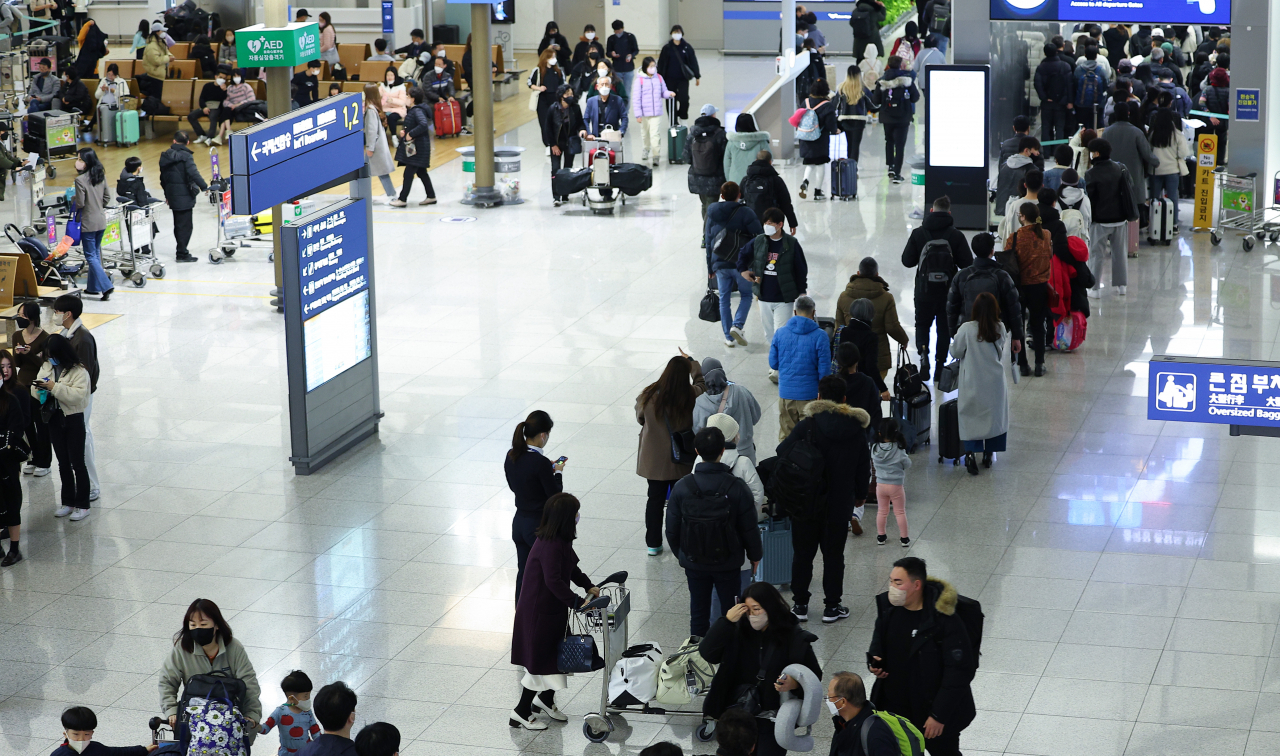 |
Passengers are waiting in line at Incheon International Airport Terminal 1 on Sunday. (Yonhap) |
A new rule mandating those traveling from China to South Korea via airplane or ship to get a PCR test upon arrival was applied Monday along with visa restrictions, as Seoul expressed concerns over a spike in imported cases from the neighboring country.
For the next two months, travelers from China for short-term visits of fewer than 90 days are required to get tested immediately upon arrival, and will be accommodated at the airport until their test results are known, according to authorities. Long-term travelers including Korean nationals must be tested at a public health center within a day of entry and quarantine at their residence until test results confirm they are negative.
Passengers from China are required to fill out their Korean address and contact information and screen for symptoms via an electronic questionnaire. Travelers will be restricted from boarding if the necessary information is inadequate.
Flights to South Korea from China are also only permitted to land at Incheon Airport.
The toughened quarantine measures for travelers arriving from China come after the country saw an uptick in imported cases from China, according to the Korea Disease Control and Prevention Agency.
On Sunday, the number of imported cases surpassed 100 for the first time in about three months. Of the 110 imported cases, 25 were from China.
Health Minister Cho Kyoo-hong said the rapid spread of COVID-19 cases is looking serious during a COVID-19 response meeting held Sunday.
“The number of confirmed cases has rapidly increased in major cities like Beijing after the Chinese government lifted some of its policies on Dec. 7. There were concerns that the number of visitors from China due to the year-end and New Year's holidays and eased quarantine measures would increase,” Cho said.
Last month, China pivoted away from its harsh "zero-COVID" policy amid widespread protests from locals. Under eased restrictions, frequent coronavirus tests and health codes are no longer required for daily life or to travel within the country.
Since scrapping its stringent pandemic-related restrictions, cities across China have been struggling with a surge in infections, resulting in a shortage of beds and medicine.
Following the government’s response to toughened quarantine measures for all travelers from China, all passengers flying from China must submit a PCR test conducted two days prior to departure or provide a rapid antigen test result a day before boarding, starting Thursday.
These rules are to be in place until Feb. 28 and could be extended depending on the outbreak situation.
Additionally, the government will restrict short-term visas for Chinese nationals until the end of this month from diplomatic missions in China. Visas for diplomats, public officials, essential businesses and humanitarian purposes are not subject to the restrictions.
Travelers from Hong Kong and Macao are not subject to the rules.
Meanwhile, the country has been beefing up efforts to contain a surge in virus cases as winter resurgence worries are escalating.
On Monday, the KDCA recommended receiving updated vaccine shots, citing waning immunity levels among the population, and said it would consider offering gift vouchers to those who have received the boosters.
“Like gift cards are given to blood donors, gift vouchers should also be given to those getting bivalent boosters to boost people’s immunity,” said Jung Ki-suck, head of the KDCA’s COVID-19 Special Response Team, during Monday’s regular briefing.
Jung added that the updated vaccine prevents infection from the BA.5 subvariant, which currently accounts for more than 60 percent of confirmed cases.
For the 24 hours of Sunday, South Korea reported 22,735 new COVID-19 cases including 35 cases from overseas, bringing the total to 29,139,535, according to the KDCA. A total of 53 new deaths were also reported, bringing the death toll to 32,272. The number of critically ill patients stood at 637.





![[Exclusive] Hyundai Mobis eyes closer ties with BYD](http://res.heraldm.com/phpwas/restmb_idxmake.php?idx=644&simg=/content/image/2024/11/25/20241125050044_0.jpg)
![[Herald Interview] 'Trump will use tariffs as first line of defense for American manufacturing'](http://res.heraldm.com/phpwas/restmb_idxmake.php?idx=644&simg=/content/image/2024/11/26/20241126050017_0.jpg)
![[Herald Review] 'Gangnam B-Side' combines social realism with masterful suspense, performance](http://res.heraldm.com/phpwas/restmb_idxmake.php?idx=644&simg=/content/image/2024/11/25/20241125050072_0.jpg)